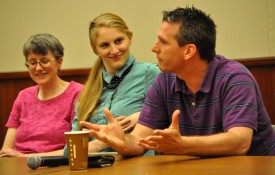News Editor
Photo by: Stephanie Hall
Following their forum on religion and science last November, the Philosophy Club invited students and community members to engage in open conversation on sex and sexuality on April 30.
“A lot like what we did last time is let you have a different perspective so you can have a well-rounded viewpoint,” Philosophy Club president Andy Bowen said.
Sporting a diverse selection of panelists, the club hoped to challenge audience members’ deeply-imbedded perceptions.
“There are a lot of things in sexuality that seem to be fairly uncritical and unexamined and thought to be believed because someone else believed it,” Bowen said.
The panel began with an important discussion on relationships and gender roles. “I think that on one level we can’t avoid categorization,” Philosophy Club member Remy Currier said. “I tend to think of gender as something that’s completely socially constructed.”
Remy’s fellow panelists concurred,but expanded his argument to demonstrate why we instinctively and logically sort people into different groups with expected roles and behaviors.
“We need to distinguish who’s an ally, who’s an enemy and who we can eat first,” Feminist Association President Chani Capps said.
As discussion drifted towards more direct subjects like traditional family values and the institution of marriage, it became apparent that such natural codification is done quite differently from person to person.
For Sarah Swedberg, history professor and GSA advisor, the idea of marriage is completely out of the question.
“I think marriage is an oppressive institution because it is traditionally the transfer of property from father to son,” Swedberg said.
Swedberg was heavily influenced by the LGBT movement of the ‘70s and was fascinated by the portrayal of love as something counter to the monogamous norm.
“I think it [the traditional family] really is this made up belief about some past that never existed,” Swedberg said.
However, Capps wasn’t so sure.
“We can hold grudges against marriage for what it meant,” she said, “but marriage is being together and loving someone.”
Capps also mentioned oxytocin, a brain chemical released during intercourse to encourage bonding behavior, which panelist Sara Trappett argued wasn’t the only factor in the decisions we make regarding relationships.
“Sometimes I don’t want to cuddle at all,” Trappet said.
For Trappet, the debate over marriage had much less to do with philosophy and a lot more to do with practicality.
“The reason we got married in a ceremony is because at this point in time this is how we’re going to stay in economic harmony with one another,” Trappet said.
What had started out as a rather linear unpacking of social behavior soon became a presentation of completely alternative viewpoints with few conclusive statements, but it isn’t always about the resolution.
“I think talking about controversial issues allows everything to be brought out on the table,” student Caly Hedlund said.
Bringing heavy issues to the table is certainly something the Philosophy Club excels at, and the results, while sometimes both questionable and uncomfortable, go a long way to bridge communication barriers. As Bowen noted, “People are able to accept one another on a different level after they’ve already heard it.”
cferganc@mavs.coloradomesa.edu

Recent Comments